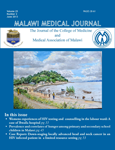
|
Malawi Medical Journal
College of Medicine, University of Malawi and Medical Association of Malawi
ISSN: 1995-7262
Vol. 26, No. 2, 2014, pp. 38-41
|
 Bioline Code: mm14009
Bioline Code: mm14009
Full paper language: English
Document type: Research Article
Document available free of charge
|
|
|
Malawi Medical Journal, Vol. 26, No. 2, 2014, pp. 38-41
| en |
In-vitro evaluation of the quality of Paracetamol and Co-trimoxazole tablets used in Malawi based on pharmacopoeial standards
Khuluza, Felix
Abstract
Objectives
This study was an in-vitro evaluation of different brands of paracetamol and
cotrimoxazole tablets, used or found in Malawi, based on Pharmacopoeia
standards, in order to ascertain the existence and extent of substandard
medicines in Malawi and to give an overview of their distribution in the
public and private sectors.
Methodology
A cross-sectional analytical study was conducted using 11 samples each
of paracetamol and cotrimoxazole tablets. Stratified random sampling
was used to collect samples. Samples were analyzed using HPLC and
Spectrophometric methods as outlined in the BP-2007 and USP-32 at the
National Drug Quality Control Laboratory (NDQCL)-Lilongwe (under
Pharmacy Medicines and Poisons Board-PMPB) and Orient Pharma Co.
Ltd of Taiwan. The results were analyzed using Epi Info.
Results and discussion
Fifty percent of samples (n=22) were not registered in the country by the
PMPB as required by the PMP Act with the majority of those coming
from public health facilities. All paracetamol and cotrimoxazole samples
complied with identification tests using spectrophotometric and HPLC
method. Overall, 27.3% of samples failed to meet the BP-2007 standards
for Active Ingredient content, while 22.7% of the samples failed the
Friability test. The results from Malawi are similar in magnitude to those
within surrounding countries in Africa.
Conclusion
This pilot study provides objective evidence to show that substandard
and unregistered paracetamol and cotrimoxazole are present and being
used in Malawi, and thus posing a considerable hazard to public health in
Malawi. PMPB, together with the Ministry of Health, must continue to
develop a quality assurance system to ensure that medicines are randomly
and routinely checked.
|
| |
© Malawi Medical Journal
Alternative site location: http://revista.uft.edu.br/index.php/jbb/index
|
|
